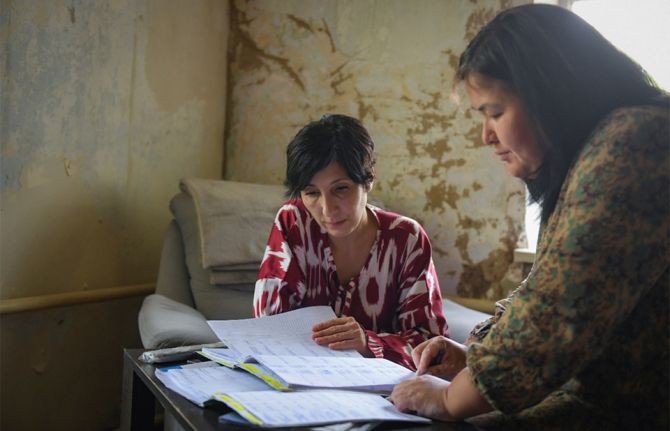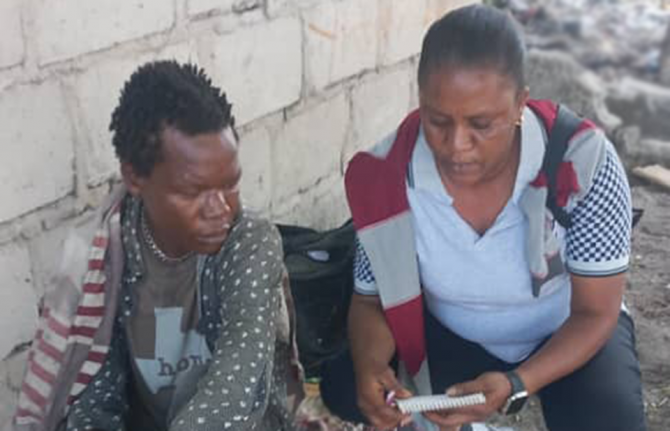
Feature Story
ICASA 2008: HIV in prison settings
06 December 2008
06 December 2008 06 December 2008
(from left) Sylvie Bertrand, UNODC Regional Programme Coordinator HIV and AIDS in Prison Settings - Southern Africa; Dr Johnson Byabashaija, Commissioner General Uganda Prisons Service
Credit: UNAIDS/Mamadou Gomis
“If we do not implement adequate measures to prevent HIV infection in prisons, people incarcerated will always be vulnerable to the disease,” said Mr Gallo Diop, a former prisoner and AIDS advocate from Senegal.
Mr Diop was speaking on Friday 5 December at an ICASA session organized by the United Nations Office on Drugs and Crime (UNODC) titled “HIV and AIDS prevention, care, treatment and support in prison settings”.
He emphasized that the movement of people in and out of prisons is also contributing to the spread the virus among those outside of prison settings.
Session participants analyzed the impact that HIV is having inside African prisons and there was consensus that addressing HIV situation in prisons is a key component of effective responses to AIDS.
Overcrowded prisons with poor facilities and sanitary conditions combined with a lack of HIV prevention services, health care and adequate nutrition are contributing to the spread of the virus argued participants. They identified the need for more data and research to identify the nature and patterns of risky behaviours.
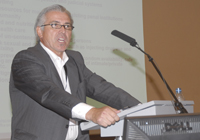
Brian Tkachuk, the United Nations Office on Drugs and Crime (UNODC) Regional Advisor for HIV and AIDS in prisons - Africa
Credit: UNAIDS/Mamadou Gomis
“There is still a knowledge gap in understanding the magnitude of the epidemic in African prisons and its multiplier effect on the non-prison population in the region,” said Brian Tkachuk, the United Nations Office on Drugs and Crime (UNODC) Africa Regional Advisor for HIV and AIDS in prisons during his presentation.
In order to mitigate the impact of HIV in prisons, Mr Tkachuk highlighted the need to raise awareness of HIV among prisoners, promote peer education and provide access to prevention interventions like availability of condoms, safe tattooing and injecting equipment, and access to private visits with partners. He also underscored the need to provide access to HIV treatment and adequate nutrition for prisoners living with HIV.
Mr Tkachuk noted that “the HIV situation in prisons remains a highly neglected area that needs immediate attention,” and he called for the adding of HIV in prisons into National AIDS responses.
“You can never succeed in addressing the AIDS situation in prisons if you don’t have total political commitment,” said Dr Johnson Byabashaija, Commissioner General Uganda prisons Service. At the same time, he emphasized, there is a need to establish strong information management systems to collect qualitative data for the development of focused advocacy and HIV prevention programmes for prison settings.
ICASA 2008: HIV in prison settings
External links:
Official web site of ICASA 2008
Multimedia:
Interview with UNODC Africa Regional Advisor for HIV and AIDS, Brian Tkachuk

Feature Story
ICASA 2008: Maternal health and youth focus of visits by UNAIDS Executive Director and UNAIDS Special Representative Princess Mathilde
06 December 2008
06 December 2008 06 December 2008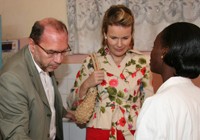 At the Centre de Santé Roi Baudouin, Dr Piot and Princess Mathilde met with staff who shared an overview of the health centre’s services. Dakar, 6 December 2008.
At the Centre de Santé Roi Baudouin, Dr Piot and Princess Mathilde met with staff who shared an overview of the health centre’s services. Dakar, 6 December 2008. Credit: UNAIDS/Jacky D. Ly
While in Senegal attending ICASA 2008, UNAIDS Executive Director Dr Peter Piot and UNAIDS and UNICEF Special Representative HRH Princess Mathilde of Belgium spent 6 December learning firsthand the successes and challenges faced in Dakar in providing HIV prevention and treatment services, in particular for women, children and young people.
In partnership with UNICEF, the Government of Belgium, and UNAIDS’ regional office for West and Central Africa and its Senegal office, UNAIDS and UNICEF jointly visited health centres supported by UNICEF where they met with health officials, medical practitioners, community mobilizers, and people living with HIV.
Centre de Santé Roi Baudouin
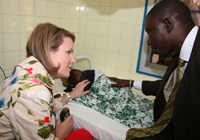
Located in Guédiawaye, on the outskirts of Dakar, this district centre is a main provider of gynaecology, obstetric, and paediatric services, and receives support on maternal and child health from UNICEF.
Credit: UNAIDS/Jacky D. Ly
At the Centre de Santé Roi Baudouin, Dr Piot and Princess Mathilde met with staff who shared an overview of the health centre’s services and chatted with patients and their families. Located in Guédiawaye, on the outskirts of Dakar, this district centre is a main provider of gynaecology, obstetric, and paediatric services, and receives support on maternal and child health from UNICEF. It also provides antiretroviral treatment for more than 300 people living with HIV. Voluntary counselling and testing services are offered as well as services for the prevention of mother-to-child transmission of HIV. With tuberculosis a leading cause of death for people living with HIV in sub-Saharan Africa, the Roi Baudouin centre provides treatment to address TB/HIV co-infection.
Centre Conseil pour Adolescents – an open environment
The second visit of Dr Piot and Princess Mathilde was to the nearby Centre Conseil pour Adolescents (CCA). The CCA serves as an important access point to reach out to young people with a range of HIV prevention, care and support services. The centre has a working relationship with the health centre ensuring that young people who are in need of treatment have access to it.
The CCA provides treatment for other sexually transmitted infections. As a drop-in youth centre with a strong recreational component, the CCA is an open environment where young people feel comfortable getting information about sex and reproductive health without fearing stigma or judgement. The CCA in Guédiawaye was the first of its kind in Senegal and there are now 13 others like it throughout the country.
Self-sufficiency
Dr Piot and Princess Mathilde ended their joint UNAIDS and UNICEF visit at the Centre Régional du Recherche de Formation within the Centre Hospitalier Universitaire de Fann – a research and training institution that has a long tradition in the country. Since 2007, the centre has provided HIV treatment to more than 3,500 people in need.
Self-sufficiency is a distinguishing feature of the centre. It has a vegetable garden where fresh food is grown to help boost patients’ nutritional needs. Through its national, regional and international networks, the centre shares and receives information regarding HIV and other sexually transmitted infections. Dr Piot and Princess Mathilde were briefed on an upcoming virtual health library project hopes to expand on-line to reach more people.
ICASA 2008: Maternal health and youth focus of vi
Press centre:
Young people and leadership in AIDS at centre of Dr Piot and Princess Mathilde’s ICASA activities (7 December 2008)
External links:
Related
 “Who will protect our young people?”
“Who will protect our young people?”

02 June 2025

Feature Story
Religious and traditional leaders discuss HIV at ICASA 2008
05 December 2008
05 December 2008 05 December 2008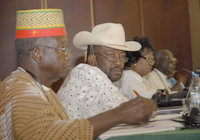
Credit: UNAIDS/Mamadou Gomis
Opinions on sexuality and condom use vary depending on the different beliefs of religious and traditional leaders in Africa. Nonetheless, today at ICASA there was general agreement that regardless of an individual’s choices, human beings should be treated equally and with respect.
“We cannot fight AIDS if part of the population is marginalized,” said panelist Fatima Ball. “We have to take care of everybody but especially the most vulnerable”.
Religious and traditional leaders reflected on their roles and responsibilities in the response to the HIV on Friday in a session moderated by UNAIDS Director of Partnerships and External Relations Mr Elhadj Amadou Sy. The session took the form of a debate, where the audience posed questions to the panel.
Recognizing a shared commitment to the AIDS response, it was underlined at the session that religious and traditional leaders have norms and values that can either contribute effectively to the response or can become inhibiting factors.
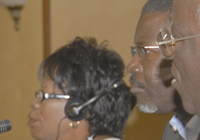
The session was moderated by UNAIDS Director of Partnerships and External Relations Mr Elhadj Amadou Sy
Credit: UNAIDS/Mamadou Gomis
Religious leaders often have high expectations placed upon them by their local communities. As a result, they may be charged with reaching out to communities and addressing a complex range of social behaviours and attitudes. Although religious leaders are often best placed to address these aspects, many expressed that they do not have sufficient levels of support to perform their roles.
Equipping traditional leaders with knowledge of HIV and how it is transmitted, and strengthening their skills, was seen as an important way forward.
Religious and traditional leaders discuss HIV at
Multimedia:
UNAIDS Director of Partnerships and External Relations Elhadj Amadou Sy discusses the outcomes of a meeting of religious and traditional leaders. Dakar, 5 December 2008
External links:

Feature Story
ICASA 2008: Princess Mathilde of Belgium highlights the role of young people in Africa’s AIDS response
05 December 2008
05 December 2008 05 December 2008
UNAIDS and UNICEF Special Representative HRH Princess Mathilde of Belgium. Credit: UNAIDS/Mamadou Gomis
Participants in a series of ICASA sessions on youth leadership and Africa’s AIDS response were in clear and unanimous agreement: young people are vital to preventing new HIV infections and moving towards the goal of an AIDS-free generation.
UNAIDS and UNICEF Special Representative HRH Princess Mathilde of Belgium was one of those who reconfirmed her commitment to youth and HIV issues. Attending ICASA 2008 this week, today she participated in two sessions on heightening the engagement of young Africans’ in the AIDS response.
Princess Mathilde and UNAIDS Executive Director Dr Peter Piot opened the first session on youth leadership, which was moderated by UNAIDS Special Representative Gaetano Kagwa, a Ugandan national and well-known AIDS advocate. They were joined by representatives of youth non-governmental organizations from Cameroon, Botswana, Senegal, and Zambia.

(from left): HRH Princess Mathilde of Belgium; Dr Pape Salif Sow, Head of the infectious diseases, Fann University teaching hospital, Dakar; Dr Peter Piot UNAIDS Executive Director
Credit: UNAIDS/Mamadou Gomis
Dr Piot introduced Princess Mathilde and commended her for her engagement and activism with AIDS and young people.
During her opening remarks, Princess Mathilde shared three points that can be instrumental in an improved response to AIDS in Africa: young people need to be more engaged and included in HIV programmes; leaders must provide youth with platforms to be heard; and young people themselves have to step forward and serve as examples in their communities and to share knowledge about HIV prevention. Princess Mathilde concluded by calling on girls and young women to be active participants in the AIDS response.
At an afternoon session, “Intergenerational dialogue: Where are the young leaders in the African response to AIDS?” Dr Piot and Princess Mathilde were joined by other leaders and representatives from several African youth organizations.
With a strong presence of young people in the audience, the panellists expressed their optimism for Africa’s next generation but outlined the challenges that lie ahead in terms of confronting the impact of AIDS on young people – one of the groups most affected by HIV.
Throughout the day’s sessions, participants stressed the need to better address HIV and young people given that young people remain at the centre of the AIDS epidemic in terms of increasing rates of infection, vulnerability, impact, and – most importantly – potential for change.
Globally, an estimated 5.5 million of the 33 million living with HIV are young people aged 15-24 years and about 45% of new HIV infections in 2007 were among 15 to 24 year olds.
ICASA 2008: Princess Mathilde of Belgium highligh
External links:
Related
 “Who will protect our young people?”
“Who will protect our young people?”

02 June 2025

Feature Story
ICASA 2008: Long term financing for a sustainable response in Africa
05 December 2008
05 December 2008 05 December 2008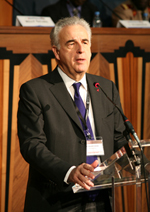
Dr Michel Kazatchkine, Executive Director of the Global Fund to Fight AIDS, TB and Malaria
Credit: UNAIDS/Jacky Daniel Ly
Sustainable investment in health is crucial for African countries’ successful development stressed Dr Michel Kazatchkine, executive director of the Global Fund to Fight AIDS, TB and Malaria.
“The world has finally understood that health is a priority for development and not a consequence of development,” said Dr Kazatchkine. “Investments in health have an impact and have saved lots of lives”.
Dr Kazatchkine was speaking at the 15th International Conference on AIDS and STIs in Africa (ICASA) where he highlighted the need for a long-term approach to the reinforcement of health systems in sub-Saharan Africa.
Financial resources for AIDS have increased significantly in the last five years because donors and the international community recognize how health can be a key investment in development. Dr Kazatchkine said that this investment coupled with an unprecedented mobilization of civil society has been showing results.
However sustainability is crucial argued Dr Kazatchkine. More predictable resources for countries generate the necessary environment that would allow countries to design programmes with the confidence that they will be sustainable. “If money is made available to countries, more programmes would be implemented and therefore the investment on AIDS would generate better results,” said Dr Kazatchkine.
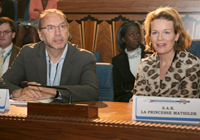
UNAIDS Executive Director Dr Peter Piot and HRH Princess Matilde of Belgium co-chaired the plenary
Credit: UNAIDS/Jacky Daniel Ly
Dr Kazatchkine also stressed that addressing the challenges of weak health systems is critical. “Donors have contributed to strengthening health systems all over the world but more resources are required to address the health systems challenges such as infrastructures, facilities or health workers,” said Kazatchkine.
Finally, he added that there is a need for more than resources. The promotion of evidence-based responses that reach out to those most in need, human rights, strengthened social protection and strengthened global and local partnerships are responsibilities shared by countries and the international community.
UNAIDS Executive Director Dr Peter Piot and HRH Princess Matilde of Belgium co-chaired the plenary which was held on Friday.
ICASA 2008: Long term financing for a sustainable
Related
 Impact of the pause of US foreign assistance in Côte d'Ivoire
Impact of the pause of US foreign assistance in Côte d'Ivoire

19 February 2025

Feature Story
ILO and workplace leaders pledge action at ICASA 2008
04 December 2008
04 December 2008 04 December 2008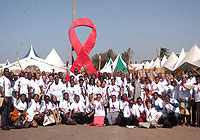
Workplace leaders pledge action at ICASA 2008
Credit: ILO
On the occasion of the 15th International Conference on AIDS and Sexually Transmitted Infections in Africa (ICASA), about fifty workplace leaders gathered together on 4 December at the invitation of the International Labour Organization (ILO).
Earlier in the week, the delegates had visited the Workplace Leaders Pledge Centre and committed themselves to implementing specific initiatives to address HIV in their own workplaces once they return home from the conference.
The ILO recorded the workplace pledges of the participants and invited them to join Mr. Mamadou Sow, the Permanent Secretary of the Ministry of Labour of Senegal, Mr. Assane Diop, the ILO Executive director for Social Protection, Mr. Patrick Obath and Mr. Lamine Fall representing respectively the employers and workers organizations as well as Dr. Sophia Kisting, Director of the ILO Programme on HIV/AIDS and the world of work for the group photo.
“Many ICASA delegates are HIV experts in various fields and probably spoke about HIV/AIDS in a number of forums. However, some might not have thought of taking HIV activities into their own workplace,” explained Dr. Kisting.
Each participant who made a pledge received a gift as a reminder of his or her commitment. The ILO ‘Workplace Leaders Pledge Centre’ will welcome participants until the end of the Conference. It is situated at the ILO stand in the exhibition area next to the UNAIDS stand with other co-sponsors.
Ms. Evelyn Serima, ILO HIV/AIDS Technical Specialist with the ILO Sub-regional Office for Southern Africa, explained that the pledges received demonstrate the commitment of employers and workers to contribute to a more sustained response to HIV/AIDS through workplace leadership.
ILO and workplace leaders pledge action at ICASA

Feature Story
ICASA 2008: Improving national private sector HIV responses
04 December 2008
04 December 2008 04 December 2008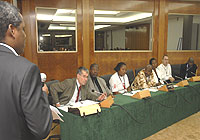
UNAIDS and ILO Joint Satellite Session, 3 December 2008
Credit: UNAIDS
A consensus is emerging at ICASA that in countries across Africa the private sector needs to work more closely together in order to be successful in responding to AIDS.
According to Sophia Kisting, Director of ILO-AIDS speaking at a UNAIDS ILO session yesterday, "The different private sector actors—companies, small and medium enterprises, informal sector—have to work together towards delivering a coherent and comprehensive private sector response to AIDS. We owe that much to those who are affected by the epidemic."
The joint Satellite Session entitled “working towards a comprehensive private sector response at the national level.” It was an opportunity for participants shared what’s working and what needs to be improved in their countries.
Strengthening partnerships across the private sector, reaching out to the surrounding community as well as mobilizing financial and technical resources for HIV were the issues addressed by the delegates.
For this discussion members of the Ghana Business Coalition on AIDS, Federation of Kenyan Employers, Malawi Congress of Trade Unions, Rio Tinto, Standard Bank Africa joined representatives from the International Organization of Employers, ILO, Fondation Sogebank, World Bank, UNAIDS Technical Support Facilities, Partners Against AIDS, GTZ, and the Global Business Coalition on HIV/AIDS, TB and Malaria.
Strengthening partnerships, reaching out to the community
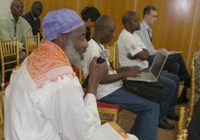
Aldiouma Cissokho addresses the event
Credit: UNAIDS
In Zimbabwe where the Employers’ Confederation, the National Business Coalition and others have created a national forum on the private sector to ensure one voice of the private sector at the Global Fund Coordinating Country Mechanisms.
Another challenge expressed was that have strong leadership. Mr Patrick Obath, Chairman of the Federation of Kenyan Employers, shared their efforts to encourage CEOs to get tested for HIV as a way of generating more support for voluntary testing and counselling within their own companies.
Rio Tinto’s Health Director Mr. Bruno Buclez presented the partnership agreement they have signed with the Government of Cameroon whereby the government is supplying free drugs and the company is making its health facilities available to its employees and to the community. One of the concerns raised about such Public Private Partnerships is their sustainability. This is something Rio Tinto is assessing at the moment. For example, the company is trying to ensure that employees living with HIV who retire from the company continue to receive HIV treatment.
Mr. Tony VanderNest, Senior Health and Wellness, Standard Bank Africa, South Africa explained that his company supports national business coalitions and the Pan African Business Coalition (through notably personnel secondment) because these coalitions are the best vehicle to share experiences among companies.
Mobilizing financial and technical resources for HIV and AIDS.
Ms. Thérèse Lethu, Director from the GBC Europe showcased how the coalition is encouraging sectoral initiatives such as in the tourism and mining industries to optimize the impact of the private sector on the national systems is the primary goal of the GBC.
All participants also agreed that the role of small and medium enterprises should be enhanced. As Erick Maville, Technical Director, GBC Europe explained, "While progress has been made to enhance the contributions of the private sector to the response to AIDS, there is still a lot to do to enhance the participation of small and medium enterprises and the informal sector."
ICASA 2008: Improving national private sector HIV
Cosponsors:
External links:
Oficial web site of ICASA 2008
Contact:
Marie Engel Partnerships Adviser Private Sector Partnerships UNAIDS Tel: +41 22 791 554 Email : engelm@unaids.org

Feature Story
ICASA 2008: Free condoms in hotels as part of HIV prevention initiative
04 December 2008
04 December 2008 04 December 2008
As 5000 delegates from across Africa and the world gather in Dakar this week, condoms are being made freely available for delegates in hotels in the city as part of a HIV prevention drive.
The Global Business Coalition on HIV/AIDS, Tuberculosis and Malaria (GBC) and UNAIDS have teamed up with the Senegal Hotel Industry around an HIV awareness initiative.
The 15th International Conference on AIDS and STIs in Africa which runs until Sunday this week has drawn aapproximately 5000 delegates and several hundred journalists from all over the world to Dakar. The event presents an opportunity to engage the local hotel industry on issues related to HIV. The hotel industry is a key player in the response to AIDS as it reaches a wide and diverse audience, including employees, with HIV prevention information.
A kit has been distributed in all hotels which includes condoms provided by the United Nations Population Fund (UNFPA); a flyer to present the initiative; and a copy of a short prevention film directed by Accor and Air France for broadcast in hotel rooms or lobbies.
Partnering hotels
The 18 ICASA-accredited hotels were approached to voluntarily take part and they have the option to customize the content according to their specific needs. Additional hotels in Dakar are also free to join.
Two fold initiative
As well as a specific HIV prevention campaign during ICASA, the initiative also will develop an HIV action plan over the long term. This will focus on delivering workshops for senior management (such as hotel managers and human resource managers) to help participating hotels develop a practical plan to respond to AIDS in their own organization.
Training sessions for staff will also be developed and will focus on the risks of HIV in the hotel industry. These sessions will help them understand their respective roles in the practical implementation of an HIV action plan within their organization. UNAIDS is providing seed money for the initial trainings.
Technical Partners
Three local non-governmental organizations ENDA Tiers Monde/Santé, Sida Services and ACI Senegal are the technical partners for the implementation of the training process and the follow up with hotels. These NGOs will conduct an initial mapping of the HIV vulnerability of each hotel. The analysis will be conducted with the participation of hotel personnel.
Background
This is a continuation of the HIV awareness initiative by UNAIDS and the hotel industry during the International AIDS Conference held in Mexico City in August 2008 which reached out to over 5000 employees within 50 hotels.
It’s also part of a global HIV prevention campaign conducted by the GBC within their tourism and travel platform: disseminating HIV awareness videos in airport lounges and on TVs via TV5 Monde, developing a prevention campaign online with a fun quiz on the website of Europe Assistance, conducting voluntary counselling and testing mobile clinics at the Sofitel Terenga, Novotel and Club Med Cap Skirring.
Next steps
On 2 December, a meeting took place at the Sofitel Dakar with 6 hotel managers to gather their suggestions and define the scope of the project and the roadmap. The analysis of hotels’ specific needs, as well as the workshops and training sessions will start after ICASA and spread over 2009.
ICASA 2008: Free condoms in hotels as part of HIV
External links:
Official web site of ICASA 2008
Europ Assistance Group corporate social responsibility HIV/AIDS Quiz
Contact:
Marie Engel Partnerships Adviser Private Sector Partnerships UNAIDS Tel: +41 22 791 554 Email : engelm@unaids.org

Feature Story
ICASA 2008: First Ladies of Africa speak out on stigma
04 December 2008
04 December 2008 04 December 2008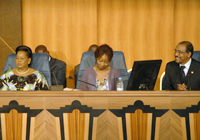 (from left) First Lady of Mali, Madame Lobbo Traore Toure; Minister of Women, Senegal, Madame Awa Ndiaye; UNAIDS Deputy Executive Director Mr Michel Sidibé. Dakar, 4 December 2008. Credit: UNAIDS/Mamadou Gomis
(from left) First Lady of Mali, Madame Lobbo Traore Toure; Minister of Women, Senegal, Madame Awa Ndiaye; UNAIDS Deputy Executive Director Mr Michel Sidibé. Dakar, 4 December 2008. Credit: UNAIDS/Mamadou Gomis Stigma towards people living with HIV as well as the need to halt the spread of the disease were the main themes discussed by a gathering of First Ladies of Africa which took place earlier today in Dakar. Their panel discussion on the HIV response was moderated by Mr Michel Sidibé, UNAIDS Deputy Executive Director.
On the occasion of the 15th International Conference on AIDS and STIs in Africa (ICASA) taking place in Dakar this week, high-level delegates, civil society representatives and technical experts from across Africa and elsewhere are gathering for discussions under the theme “Africa’s Response: Face the facts.”
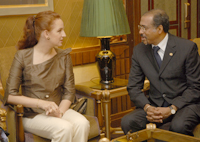
UNAIDS Deputy Executive Director Mr Michel Sidibé speaks with Princess Lalla Salma of Marocco before the First Ladies of Africa event. Dakar, 4 December 2008. Credit: UNAIDS/Mamadou Gomis
Madame Lobbo Traore Toure, First Lady of Mali; Madame Jeannette Kagame, First Lady of Rwanda and Her Royal Highness, Princess Lalla Salma of Morocco participated in this afternoon’s event.
Thanking them for their presence and for their long-term personal engagement in the AIDS response, UNAIDS Deputy Executive Director Michel Sidibé spoke of how their commitment has enabled the creation of dialogue and political action around the issue of stigma and HIV prevention.
“As mothers, spouses and concerned citizens, you, First Ladies of Africa, have decided to take leadership on AIDS, speaking out against stigma and against violence against women and girls and advocating for the protection and rights of people living with HIV,” said Mr Sidibé.
At the meeting the panelists spoke of the importance of HIV prevention programmes and brought into focus priorities including the care of orphans and vulnerable children, preventing mother-to-child HIV transmission and access to paediatric treatment. The panellists also discussed how resources could be better mobilized for HIV programmes at country level.
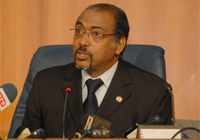
UNAIDS Deputy Executive Director Mr Michel Sidibé. Dakar, 4 December 2008. Credit: UNAIDS/Mamadou Gomis
The First Ladies shared their experiences of the HIV response through regional organizations such as the Organization of African First Ladies Against AIDS (OAFLA) and Synergies Africaines, as well as in their own countries through national organizations. The meeting was a chance to exchange perspectives and enhance collaboration in west Africa.
In 2007 the OAFLA launched the “Save the Unborn Child First Ladies Campaign” in the 50 OAFLA member countries. This campaign focuses on the prevention of HIV transmission from mother to child. The prevention of new infections among young people, and protection of children affected by HIV from stigma were the aims of the “Treat every child as your own" campaign launched by OAFLA in 2005.
Yesterday during the conference opening ceremony, Princess Lalla Salma, spouse of King Mohammed VI of Morocco, received the prize of the 15th ICASA 2008 in recognition of her commitment to the fight against AIDS. The prize was presented by ICASA's chairman, Professor Soulaymane Mboup.
ICASA 2008: First Ladies of Africa speak out on s
Feature stories:
The AIDS response: Relationship to development in Africa (22 September 2008)
African First Ladies meet on AIDS (04 February 2008)
African First Ladies determined to speed up AIDS response (04 July 2007)
Multimedia:
"Treat every child as your own" campaign launch, September 2005 (15 September 2005)
External links:
Constitution of Organization of African First Ladies Against AIDS
Synergies Africaines
Publications:
Related

Feature Story
ICASA 2008: Dr Piot reflects on 25 years of AIDS in Africa
04 December 2008
04 December 2008 04 December 2008
Dr Piot traced the history of the AIDS epidemic in Africa over the past quarter century and highlighted some key milestones in the response during a plenary session at ICASA on Thursday. Credit: UNAIDS/Mamadou Gomis
“We can not predict the future but we can certainly influence it,” said UNAIDS Executive Director Dr Piot looking ahead after his review of the past 25 years of AIDS in Africa. Dr Piot traced the history of the AIDS epidemic in Africa over the past quarter century and highlighted some key milestones in the response during a plenary session at ICASA on Thursday.
His presentation illustrated the history of AIDS from the explosive growth of the first AIDS cases in central Africa to an epidemic of well over 20 million people across the continent, and Africa’s main cause of death.
During his speech, Dr Piot underlined how emerging political leadership and civil society activism have helped to remove the silence and denial that surrounded the epidemic in the 1980s and early 90s. In some African countries, this has helped mobilize high level political commitment that is now producing results such as fewer people becoming newly infected with HIV and fewer people dying.
Dr Piot also recalled some key meetings and events, such as the Abuja Declaration on HIV in 2001; the creation of the Drug Access Initiative, and the launch of Africa’s first national AIDS treatment programme (in Botswana). He also covered some of the continent’s impressive scientific contributions to the global AIDS effort. Among these are the discoveries of HIV-2 and SIV, genetic heterogeneity of HIV, mechanisms and prevention of heterosexual and perinatal transmission, the use of cotrimoxazole to treat and prevent opportunistic infections, male circumcision.
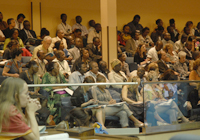
Members of the audience for Dr Piot’s presentation Credit: UNAIDS/Mamadou Gomis
As well as reviewing progress so far, the presentation looked at some of the many challenges that lie ahead. These include sustaining political commitment and funding, expanding coverage of access to antiretroviral treatment, intensifying HIV prevention, increasing technical and community capacity, and connecting the AIDS response with other public health and development efforts. Above all, Dr Piot underscored the need to know the local modes of HIV transmission in order to better tailor prevention measures/programmes.
Last week UNAIDS launched a new report calling on countries to realign HIV prevention programmes through understanding how the most recent HIV infections were transmitted, and understanding the reasons why they occurred.
“Not only will this approach help prevent the next 1,000 infections in each community, but it will also make money for AIDS work more effectively and help put forward a long term and sustainable AIDS response,” said UNAIDS Executive Director Dr Peter Piot.
Finally, Dr Piot emphasized the need to maintain an exceptional response to AIDS, not only as a short term emergency but as a long-term event that requires broad partnerships, leadership and commitment. “We can not predict the future but we can certainly influence it,” said Dr Piot.
ICASA 2008: Dr Piot reflects on 25 years of AIDS
Multimedia:
External links:
Oficial web site of ICASA 2008
Publications:
25 years of AIDS in Africa - Presentation by Dr Peter Piot, 4 December 2008.
AIDS Outlook 2009 (pdf, 608 Kb)

